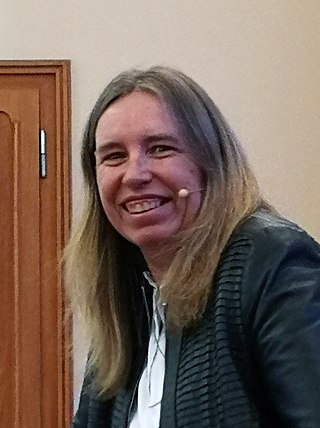
The Philipps University of Marburg is a public research university located in Marburg, Germany. It was founded in 1527 by Philip I, Landgrave of Hesse, which makes it one of Germany's oldest universities and the oldest still operating Protestant university in the world. It is now a public university of the state of Hesse, without religious affiliation.

Rita Süssmuth is a German politician of the Christian Democratic Union (CDU). She served as the tenth president of the Bundestag.

The University of Duisburg-Essen is a public research university in North Rhine-Westphalia, Germany. In the 2019 Times Higher Education World University Rankings, the university was awarded 194th place in the world. It was originally founded in 1654 and re-established on 1 January 2003, as a merger of the Gerhard Mercator University of Duisburg and the university of Essen. It is based in both the cities of Duisburg and Essen, and a part of University Alliance Metropolis Ruhr.

The Gottfried Wilhelm Leibniz Prize, or Leibniz Prize, is awarded by the German Research Foundation to "exceptional scientists and academics for their outstanding achievements in the field of research". Since 1986, up to ten prizes have been awarded annually to individuals or research groups working at a research institution in Germany or at a German research institution abroad. It is considered the most important research award in Germany.

The Berlin-Brandenburg capital region is one of the most prolific centers of higher education and research in the world. It is the largest concentration of universities and colleges in Germany. The city has four public research universities and 27 private, professional and technical colleges (Hochschulen), offering a wide range of disciplines. Access to the German university system is tuition free.

Hélène Esnault is a French and German mathematician, specializing in algebraic geometry.
The Max Planck Institute for Legal History and Legal Theory, situated in Frankfurt/Main, is one of 83 institutes and research facilities of the Max Planck Society (MPG).

The Bibliotheca Hertziana – Max Planck Institute for Art History is a German research institute located in Rome, Italy. It was founded by a donation of Henriette Hertz in 1912 as a Kaiser Wilhelm Institute. Of the 84 institutes in the Max Planck Society, it is one of the few not located in Germany. The institute is situated in the historical centre of Rome near Trinità dei Monti in a cluster of four buildings along the Via Gregoriana: the 16th-century Palazzo Zuccari, the adjacent Palazzo Stroganoff, the Villino Stroganoff across the road and the new library building designed by the Spanish architect Juan Navarro Baldeweg.

Dahlem is a locality of the Steglitz-Zehlendorf borough in southwestern Berlin. Until Berlin's 2001 administrative reform it was a part of the former borough of Zehlendorf. It is located between the mansion settlements of Grunewald and Lichterfelde West.

The Max Planck Institute for the Study of Religious and Ethnic Diversity is located in Göttingen, Germany. It is one of 83 institutes in the Max Planck Society (Max-Planck-Gesellschaft).
The Berlin Graduate School of Natural Sciences and Engineering (BIG-NSE) is part of the Cluster of Excellence "Unifying Concepts in Catalysis" (UniCat) founded in November 2007 by Technische Universität Berlin and five further institutions in the Berlin area within the framework of the German government‘s Excellence Initiative.

Otto Haxel was a German nuclear physicist. During World War II, he worked on the German nuclear energy project. After the war, he was on the staff of the Max Planck Institute for Physics in Göttingen. From 1950 to 1974, he was an ordinarius professor of physics at the University of Heidelberg, where he fostered the use of nuclear physics in environmental physics; this led to the founding of the Institute of Environmental Physics in 1975. During 1956 and 1957, he was a member of the Nuclear Physics Working Group of the German Atomic Energy Commission. From 1970 to 1975, he was the Scientific and Technical Managing Director of the Karlsruhe Research Center.
Herbert Wagner is a German theoretical physicist, who mainly works in statistical mechanics. He is a professor emeritus of Ludwig Maximilian University of Munich.

Anja Feldmann is a German computer scientist.

Colin John Crouch, is an English sociologist and political scientist. He coined the post-democracy concept in 2000 in his book Coping with Post-Democracy. Colin Crouch is currently Emeritus Professor at the University of Warwick and an External Scientific Member of the Max Planck Institute for the Study of Societies.
Anne Peters is a German-Swiss jurist with a focus on public international law. She is director at the Max Planck Institute for Comparative Public Law and International Law, honorary professor at the University of Basel, University of Heidelberg and Free University of Berlin, and at William W. Cook Global Law Professor at Michigan Law School.

Christine Bergmann is a German politician (SPD).
Lucio Baccaro is an Italian political economist and professor of Comparative Macro-Sociology at the University of Geneva. In 2017, he succeeded Wolfgang Streeck to become director at the Max Planck Institute for the Study of Societies next to Jens Beckert. His research lies in the fields of comparative political economy and industrial relations, focusing on growth models in the European Union.
Salvador Santino Regilme is a Dutch International Relations scholar and political scientist focusing on international human rights norms, global governance, democratization, United States foreign policy, and foreign aid. He is a tenured Associate Professor of International Relations based at the Institute of History within the Faculty of Humanities of Leiden University, the Netherlands.
Marie-Laure Salles-Djelic is a French sociologist of organizations, a university professor and a university administrator. She is director of the Geneva Graduate Institute and has been the dean of the School of Management and Innovation at Sciences Po Paris, which she launched in 2016.
![Leonhard Dobusch [de], Philip Mader and Sigrid Quack Governance across borders.pdf](http://upload.wikimedia.org/wikipedia/commons/thumb/1/16/Governance_across_borders.pdf/page1-220px-Governance_across_borders.pdf.jpg)












